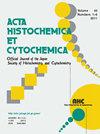Long-term Pilocarpine Treatment Improves Salivary Flow in Irradiated Mice
IF 1.6
4区 生物学
Q4 CELL BIOLOGY
引用次数: 12
Abstract
Radiation therapy for head and neck cancer frequently causes salivary gland dysfunction. Pilocarpine is a clinically approved and effective drug that induces saliva secretion, thereby keeping the oral mucosa moist and reducing discomfort in patients, but the effect is transient. We expected that this drug also has beneficial long-term effects that maintain the integrity of salivary glands by reducing, for instance, apoptosis. Here, we examined the effects of long-term pilocarpine administration in irradiated mice. The results indicated that long-term pilocarpine administration significantly improved salivary flow in irradiated mice, suggesting the potential beneficial effects of long-term administration. To elucidate the underlying mechanism, we analyzed the histology, apoptosis, and proliferation of acinar cells, and the expression of functional membrane proteins such as transmembrane member 16A, aquaporin-5, and Na-K-Cl cotransporter. Long-term pilocarpine treatment seemed to decrease irradiation-induced apoptosis, although the change was not statistically significant. The present results indicated that long-term administration of pilocarpine has beneficial effects on salivary flow in irradiated mice, and suggested that long-term administration possibly decreases apoptosis in irradiated salivary glands.Pilocarpine的长期治疗改善了受辐射小鼠的唾液流动
头部和颈部癌症的放射治疗经常导致唾液腺功能障碍。Pilocarpine是一种临床批准的有效药物,可以诱导唾液分泌,从而保持口腔粘膜湿润,减少患者的不适,但效果是短暂的。我们预计这种药物也具有有益的长期作用,通过减少细胞凋亡等方式来维持唾液腺的完整性。在这里,我们研究了长期服用毛果芸香碱对受辐射小鼠的影响。结果表明,长期服用毛果芸香碱可显著改善受照射小鼠的唾液流量,这表明长期服用毛果芸香碱具有潜在的有益作用。为了阐明潜在的机制,我们分析了腺泡细胞的组织学、凋亡和增殖,以及跨膜成员16A、水通道蛋白-5和Na-K-Cl协同转运蛋白等功能性膜蛋白的表达。长期的毛果芸香碱治疗似乎可以减少辐射诱导的细胞凋亡,尽管这种变化没有统计学意义。目前的结果表明,长期服用毛果芸香碱对受辐射小鼠的唾液流有有益的影响,并表明长期服用毛果芸香碱可能会减少受辐射唾液腺的细胞凋亡。
本文章由计算机程序翻译,如有差异,请以英文原文为准。
求助全文
约1分钟内获得全文
求助全文
来源期刊

Acta Histochemica Et Cytochemica
生物-细胞生物学
CiteScore
3.50
自引率
8.30%
发文量
17
审稿时长
>12 weeks
期刊介绍:
Acta Histochemica et Cytochemica is the official online journal of the Japan Society of Histochemistry and Cytochemistry. It is intended primarily for rapid publication of concise, original articles in the fields of histochemistry and cytochemistry. Manuscripts oriented towards methodological subjects that contain significant technical advances in these fields are also welcome. Manuscripts in English are accepted from investigators in any country, whether or not they are members of the Japan Society of Histochemistry and Cytochemistry. Manuscripts should be original work that has not been previously published and is not being considered for publication elsewhere, with the exception of abstracts. Manuscripts with essentially the same content as a paper that has been published or accepted, or is under consideration for publication, will not be considered. All submitted papers will be peer-reviewed by at least two referees selected by an appropriate Associate Editor. Acceptance is based on scientific significance, originality, and clarity. When required, a revised manuscript should be submitted within 3 months, otherwise it will be considered to be a new submission. The Editor-in-Chief will make all final decisions regarding acceptance.
 求助内容:
求助内容: 应助结果提醒方式:
应助结果提醒方式:


